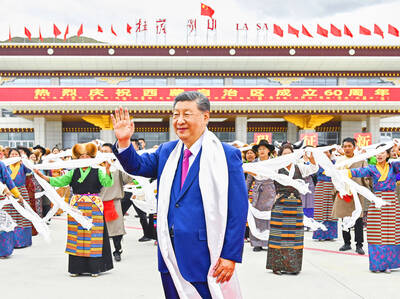Al-Qaeda leaders in hiding and foot soldiers preparing for terror attacks around the world are turning to outlawed Pakistani extremist groups for spiritual and military training, shelter and logistical support, say US officials, who see them as an emerging threat.
One group -- called Lashkar-e-Tayyaba, (Army of the Pure) -- represents an example of how Osama bin Laden's followers take advantage of scattered Islamic militant allies to maintain momentum four years after a US-led military campaign destroyed al-Qaeda camps in Afghanistan.
Lashkar is among a number of organizations dedicated to wresting control of the Indian-ruled parts of Kashmir. US officials say the group stands out for a number of reasons, however, including its missionary work and other involvement outside the region.
Parts of Pakistan's intelligence services previously supported Lashkar, but Pakistani President General Pervez Musharraf banned Lashkar in 2002 for its alleged links to an attack on India's parliament.
Lashkar leaders insist the group's focus is to free Muslims in the Indian-controlled sector of Kashmir, not attacks on the West. Pakistani officials say the group is local, not international.
In an interview, the Pakistani ambassador to the US, Jehangir Karamat, said he considers Lashkar incapable of international terrorism, particularly working with al-Qaeda, because the groups have different languages and agendas.
"They have no links with any organization in Pakistan," Karamat said, speaking of al-Qaeda. "They don't need them, and they don't have them. Never had them."
Still, the US is watching Lashkar closely because of its apparent willingness to help those involved in the global jihad on a grass-roots level.
The US officials, who spoke on condition of anonymity because of the subject's sensitivity, said they don't believe Lashkar's leadership is coordinating international attacks with groups including the remnants of al-Qaeda. Instead, they worry about connections among foot soldiers -- extremists who may point friends of friends to paramilitary camps.
Last year, the State Department estimated the group had several thousand members.
The Lashkar organization represents a classic example of the diffusion of Islamic extremism -- based in Afghanistan until the US threw out the Taliban regime in 2001 -- that CIA Director Porter Goss and other intelligence officials have warned of.
Ken Katzman, a Middle East expert at the Congressional Research Service, said groups including Lashkar have revived the training infrastructure formerly found in Afghanistan, setting up "Afghanistan East" in northern Pakistan. Some in Pakistan deny the camps' existence.
"I think this is emerging as the next theater to test whether Pakistan is serious about eliminating the al-Qaeda presence," Katzman said.
Some examples of high-profile moments where Lashkar's fingerprints are suspected or spotted:
International authorities are looking into whether an Islamic school run by Lashkar trained, perhaps even spiritually, at least one of the bombers who attacked four London buses on July 7. Officials also are looking closely at the associations of the three other bombers. Pakistani authorities have yet to find direct links and say any tie may be a small piece of the investigation.
In Virginia, a prominent Islamic scholar was sentenced to life in prison this year for encouraging his followers to join the Taliban and fight the US after 9/11. After one fiery speech, several attendees went to Pakistan and received military training from Lashkar. The young men were part of the "Virginia jihad network" that sometimes trained for holy war by playing paintball games in the woods.
US officials say Abu Farraj al-Libbi, a top al-Qaeda operational leader picked up in Pakistan in May, ran from a site associated with Lashkar before Pakistani forces captured him in a graveyard shootout. He is in US custody, accused of planning two assassination attempts on Musharraf. Pakistani officials have said al-Libbi was sheltered by another Muslim militant organization.
In March 2002, another senior al-Qaeda lieutenant and planner, Abu Zubaydah, was captured at a Lashkar safe house in Faisalabad, Pakistan.
The so-called "Australian Taliban," David Hicks, who US forces captured fighting with the Taliban in Afghanistan, was trained by Lashkar in the late 1990s. He is now being held in Guantanamo Bay, Cuba.

Ten cheetah cubs held in captivity since birth and destined for international wildlife trade markets have been rescued in Somaliland, a breakaway region of Somalia. They were all in stable condition despite all of them having been undernourished and limping due to being tied in captivity for months, said Laurie Marker, founder of the Cheetah Conservation Fund, which is caring for the cubs. One eight-month-old cub was unable to walk after been tied up for six months, while a five-month-old was “very malnourished [a bag of bones], with sores all over her body and full of botfly maggots which are under the

BRUSHED OFF: An ambassador to Australia previously said that Beijing does not see a reason to apologize for its naval exercises and military maneuvers in international areas China set off alarm bells in New Zealand when it dispatched powerful warships on unprecedented missions in the South Pacific without explanation, military documents showed. Beijing has spent years expanding its reach in the southern Pacific Ocean, courting island nations with new hospitals, freshly paved roads and generous offers of climate aid. However, these diplomatic efforts have increasingly been accompanied by more overt displays of military power. Three Chinese warships sailed the Tasman Sea between Australia and New Zealand in February, the first time such a task group had been sighted in those waters. “We have never seen vessels with this capability

A Japanese city would urge all smartphone users to limit screen time to two hours a day outside work or school under a proposed ordinance that includes no penalties. The limit — which would be recommended for all residents in Toyoake City — would not be binding and there would be no penalties incurred for higher usage, the draft ordinance showed. The proposal aims “to prevent excessive use of devices causing physical and mental health issues... including sleep problems,” Mayor Masafumi Koki said yesterday. The draft urges elementary-school students to avoid smartphones after 9pm, and junior-high students and older are advised not

Chinese President Xi Jinping (習近平) attended a grand ceremony in Lhasa yesterday during a rare visit to Tibet, where he urged “ethnic unity and religious harmony” in a region where China is accused of human rights abuses. The vast high-altitude area on the country’s western edge, established as an autonomous region in 1965 — six years after the 14th Dalai Lama fled into exile — was once a hotbed for protest against Chinese Communist Party rule. Rights groups accuse Beijing’s leaders of suppressing Tibetan culture and imposing massive surveillance, although authorities claim their policies have fostered stability and rapid economic development in